Ancient Plastix Ancient Plastix LP (Maple Death)
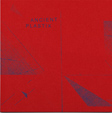 Debut album here from Liverpool’s Ancient Plastix, a solo endeavor from one Paul Rafferty (previously of noise-punkers Bad Meds). Nothing particularly noisy or punk about Ancient Plastix, though – this is purely synthetic composition, ten melodically-centered pieces with soaring highs, robust bass tones and a vague sense of awe, like watching an IMAX movie about introspective cosmonauts or the life cycle of sea turtles. This isn’t a soundtrack though, it’s music meant for home listening, and while it’s perfectly fine by my ears, there’s a sort of anonymity, or perhaps genericness, that exists within these tracks. I’m reminded of Tangerine Dream, as well as the outputs of new-age-y electronics labels like Palace Of Lights and Music From Memory; it’s an easy classification for this sort of thing, but there’s nothing happening on Ancient Plastix that clashes with an easy and obvious filing. Nothing to complain about with this record, yet I kept wanting something to jump out at me, be it a glitch in the system or some impressively tender moment or perhaps something completely unexpected. For better or worse, Ancient Plastix is an adequate purveyor of mood-driven synth music.
Debut album here from Liverpool’s Ancient Plastix, a solo endeavor from one Paul Rafferty (previously of noise-punkers Bad Meds). Nothing particularly noisy or punk about Ancient Plastix, though – this is purely synthetic composition, ten melodically-centered pieces with soaring highs, robust bass tones and a vague sense of awe, like watching an IMAX movie about introspective cosmonauts or the life cycle of sea turtles. This isn’t a soundtrack though, it’s music meant for home listening, and while it’s perfectly fine by my ears, there’s a sort of anonymity, or perhaps genericness, that exists within these tracks. I’m reminded of Tangerine Dream, as well as the outputs of new-age-y electronics labels like Palace Of Lights and Music From Memory; it’s an easy classification for this sort of thing, but there’s nothing happening on Ancient Plastix that clashes with an easy and obvious filing. Nothing to complain about with this record, yet I kept wanting something to jump out at me, be it a glitch in the system or some impressively tender moment or perhaps something completely unexpected. For better or worse, Ancient Plastix is an adequate purveyor of mood-driven synth music.
Elle Barbara’s Black Space Délice Créole / Peach Purée 12″ (Celluloid Lunch)
 The two schools of punk thought seem to be that either A: it’s only punk if you’re making punk music, or B: it’s only punk if you’re doing whatever you want. Celluloid Lunch seems to follow the second philosophy, releasing dyed-in-the-leather punk bands alongside oddball indie groups and eccentric pop music, and Elle Barbara’s Black Space fits the latter. Like the label, she’s also based in Montreal, and while a quick Googling reveals that there seems to be a swirl of artistic activity surrounding her, this is a fairly straightforward 12″ single of sensual pop and disco-ball-speckled house. “Délice Créole” is a shimmering spotlight on the dance-floor, a retro-throwback that recalls Eurovision‘s greatest Donna Summer and ABBA impersonators, and the GLOWZ rework transitions the party from patio to beach, an Ibizan gem that would’ve lit up even the dullest Sandals resort back in 1987. “Peach Purée” fires up the band for an even more extravagant and colorful affair, with funky bass guitar, seasick synths and the sense that, as a listener, I’m a part-time caterer serving hors d’oeuvres at a party hosted by Serge Gainsbourg, Carly Simon and Nile Rodgers. I could soak up that vibe for hours, but it’s only one song, and the d’Eon remix that follows is a choppy hip-house rendition that trades glamour for a more aggressive beat. Always nice to have friends involved, but the original mixes shine brightest here.
The two schools of punk thought seem to be that either A: it’s only punk if you’re making punk music, or B: it’s only punk if you’re doing whatever you want. Celluloid Lunch seems to follow the second philosophy, releasing dyed-in-the-leather punk bands alongside oddball indie groups and eccentric pop music, and Elle Barbara’s Black Space fits the latter. Like the label, she’s also based in Montreal, and while a quick Googling reveals that there seems to be a swirl of artistic activity surrounding her, this is a fairly straightforward 12″ single of sensual pop and disco-ball-speckled house. “Délice Créole” is a shimmering spotlight on the dance-floor, a retro-throwback that recalls Eurovision‘s greatest Donna Summer and ABBA impersonators, and the GLOWZ rework transitions the party from patio to beach, an Ibizan gem that would’ve lit up even the dullest Sandals resort back in 1987. “Peach Purée” fires up the band for an even more extravagant and colorful affair, with funky bass guitar, seasick synths and the sense that, as a listener, I’m a part-time caterer serving hors d’oeuvres at a party hosted by Serge Gainsbourg, Carly Simon and Nile Rodgers. I could soak up that vibe for hours, but it’s only one song, and the d’Eon remix that follows is a choppy hip-house rendition that trades glamour for a more aggressive beat. Always nice to have friends involved, but the original mixes shine brightest here.
Behavior & Mayako XO Free World LP (Post Present Medium)
 Behavior’s 2016 Iron Lung full-length really rubbed me the wrong way, to the point where I went back and re-read that review and wonder if I wasn’t a little unfair – they certainly weren’t the only band playing a repetitive and loose form of spindly post-punk at the time. This time around, they’ve teamed up with LA artist Mayako XO for a new collaboration, resulting in an album “rooted in improvisation” and sorted into songs after the initial sessions. While I’d love to love this record, and redeem my previous Behavior bashing, I am not particularly feeling this one either, sad to say. Rather than sounding post-punk or remotely noisy, this long record has a ’90s indie-rock sound played lugubriously and in defiance of pop hooks. When Mayako XO sings, I’m reminded of Cat Power’s most meandering ’90s moments, and when one of the Behavior guys sings, it often sounds like an aimless Pavement jam with someone doing an Elias Rønnenfelt impression (the delivery is all off-kilter moany croaking in that same distinctive style). Whereas Pavement and Cat Power buffered their floppy rock wanderings with unique, memorable lyrics and/or catchy melodies/hooks, Behavior and Mayako XO seem completely disinterested in making Free World something to remember. There’s a charm to this approach – see Tori Kudo’s vast body of work – but I’m struggling to find it here.
Behavior’s 2016 Iron Lung full-length really rubbed me the wrong way, to the point where I went back and re-read that review and wonder if I wasn’t a little unfair – they certainly weren’t the only band playing a repetitive and loose form of spindly post-punk at the time. This time around, they’ve teamed up with LA artist Mayako XO for a new collaboration, resulting in an album “rooted in improvisation” and sorted into songs after the initial sessions. While I’d love to love this record, and redeem my previous Behavior bashing, I am not particularly feeling this one either, sad to say. Rather than sounding post-punk or remotely noisy, this long record has a ’90s indie-rock sound played lugubriously and in defiance of pop hooks. When Mayako XO sings, I’m reminded of Cat Power’s most meandering ’90s moments, and when one of the Behavior guys sings, it often sounds like an aimless Pavement jam with someone doing an Elias Rønnenfelt impression (the delivery is all off-kilter moany croaking in that same distinctive style). Whereas Pavement and Cat Power buffered their floppy rock wanderings with unique, memorable lyrics and/or catchy melodies/hooks, Behavior and Mayako XO seem completely disinterested in making Free World something to remember. There’s a charm to this approach – see Tori Kudo’s vast body of work – but I’m struggling to find it here.
Stefan Christensen Ruby 2×7″ (Ever/Never)
 Join me in celebrating the unfairly-maligned format of the double seven-inch! From Harry Pussy to Drunks With Guns to the goshdarn Inflatable Boy Clams, so many of my personal favorites have utilized this format to great ends, and now you can add experimental musician Stefan Christensen to the list. In a heartbreaking twist, Ruby is dedicated to and inspired by Christensen’s friend Rob Talbot who was murdered by cops while incarcerated in 2019. One might expect this release to be a sad and somber affair, but Christensen’s musical reaction to the situation is an entirely honest one, which is to say it’s frustrated, furious and stark. I can sense his disbelief in some of these tracks, the way that his cheap, fractured guitars strum against the odds and his vocals try to make sense of it all. Across these four short sides, guitar and voice are prominent, but there’s plenty of musical detritus to enhance the image, like the EP’s opening banjo plucks, low-lit radio interference and the air of the small rooms wherein these tracks were recorded. Christensen finds patience and resolve in these tiny, muffled songs, the Grouper-like “Goffe Porch” being the most tender of the bunch.
Join me in celebrating the unfairly-maligned format of the double seven-inch! From Harry Pussy to Drunks With Guns to the goshdarn Inflatable Boy Clams, so many of my personal favorites have utilized this format to great ends, and now you can add experimental musician Stefan Christensen to the list. In a heartbreaking twist, Ruby is dedicated to and inspired by Christensen’s friend Rob Talbot who was murdered by cops while incarcerated in 2019. One might expect this release to be a sad and somber affair, but Christensen’s musical reaction to the situation is an entirely honest one, which is to say it’s frustrated, furious and stark. I can sense his disbelief in some of these tracks, the way that his cheap, fractured guitars strum against the odds and his vocals try to make sense of it all. Across these four short sides, guitar and voice are prominent, but there’s plenty of musical detritus to enhance the image, like the EP’s opening banjo plucks, low-lit radio interference and the air of the small rooms wherein these tracks were recorded. Christensen finds patience and resolve in these tiny, muffled songs, the Grouper-like “Goffe Porch” being the most tender of the bunch.
Dali Muru & The Polyphonic Swarm Dali Muru & The Polyphonic Swarm LP (Stroom)
 It’s not cheap to fly a Stroom record over from Belgium and onto my front stoop, but I’ve yet to feel shorted in doing so. Case in point is this new one from the new-to-me Dali Muru & The Polyphonic Swarm (thankfully not the Spree), which sulks around through a maze of hallways connecting downtempo synth-wave, trip-hop and electro. Through these somewhat varied tracks, I’m picking up a variety of not-entirely-disparate sounds: the eerie post-industrial chill of Ectoplasm Girls, the peculiar vocal-house of Tom Of England, the super-slow techno grind of the Neubau label, the defiant trip-hop swagger of Leslie Winer and the left-field techno-funk of Tolouse Low Trax, who in fact lends his production to opening cut “Finest Escape” (which, ironically, doesn’t really sound anything like his other work). I just unknowingly crafted a fine playlist right there, and Dali Muru & The Polyphonic Swarm would fit in nicely, no matter if the vibe is dance-based or more of a seated chin-stroker’s delight. I like when the (severely relaxed) beats drop, which contrast nicely against some of the Midsommar-esque folk-horror conjured by other tracks. Worth every penny I spent on this record, all 3,552 of them!
It’s not cheap to fly a Stroom record over from Belgium and onto my front stoop, but I’ve yet to feel shorted in doing so. Case in point is this new one from the new-to-me Dali Muru & The Polyphonic Swarm (thankfully not the Spree), which sulks around through a maze of hallways connecting downtempo synth-wave, trip-hop and electro. Through these somewhat varied tracks, I’m picking up a variety of not-entirely-disparate sounds: the eerie post-industrial chill of Ectoplasm Girls, the peculiar vocal-house of Tom Of England, the super-slow techno grind of the Neubau label, the defiant trip-hop swagger of Leslie Winer and the left-field techno-funk of Tolouse Low Trax, who in fact lends his production to opening cut “Finest Escape” (which, ironically, doesn’t really sound anything like his other work). I just unknowingly crafted a fine playlist right there, and Dali Muru & The Polyphonic Swarm would fit in nicely, no matter if the vibe is dance-based or more of a seated chin-stroker’s delight. I like when the (severely relaxed) beats drop, which contrast nicely against some of the Midsommar-esque folk-horror conjured by other tracks. Worth every penny I spent on this record, all 3,552 of them!
Finale 255 O.P.M. 7″ (Slovenly)
 There’s a hallowed punk tradition of bands who purposely find the most annoying singer possible to front their band. I fully support this, as a purposely disgraceful upending of what constitutes “musical talent” is a joy to behold, even if the singer really, truly annoys. Valencia’s Finale are a current-day example, as the band plays a tight and poppy form of classic clean-guitar punk, recorded stainlessly enough to give off a vibe more redolent of The Hives than The Coneheads. The singer is an absolute gobbler, as if he managed to avoid using his mouth entirely and decided to sing exclusively through his nose. Reminds me of a more polished (if less memorable) version of Australia’s first-wave post-punkers Tactics, a personal favorite. Your mileage here will certainly vary depending upon your tolerance (or appreciation) of high-pitched vocal squawk. I would probably love it in person, in some crusty Spanish bar with a shirtless ninety-pound singer dangling from the water pipes, but on record it’s a fun little jolt as well. Whether or not I could handle a full album of this voice is another story entirely.
There’s a hallowed punk tradition of bands who purposely find the most annoying singer possible to front their band. I fully support this, as a purposely disgraceful upending of what constitutes “musical talent” is a joy to behold, even if the singer really, truly annoys. Valencia’s Finale are a current-day example, as the band plays a tight and poppy form of classic clean-guitar punk, recorded stainlessly enough to give off a vibe more redolent of The Hives than The Coneheads. The singer is an absolute gobbler, as if he managed to avoid using his mouth entirely and decided to sing exclusively through his nose. Reminds me of a more polished (if less memorable) version of Australia’s first-wave post-punkers Tactics, a personal favorite. Your mileage here will certainly vary depending upon your tolerance (or appreciation) of high-pitched vocal squawk. I would probably love it in person, in some crusty Spanish bar with a shirtless ninety-pound singer dangling from the water pipes, but on record it’s a fun little jolt as well. Whether or not I could handle a full album of this voice is another story entirely.
Fine Place This New Heaven LP (Night School)
 Fine Place is a new pairing between two New York artists (who Bandcamp Daily tells me are also a couple), Matthew Hord (of Pop. 1280 and Brandy) and Frankie Rose (surely you know Frankie Rose). While their other musical pursuits generally call to mind a grounded or even subterranean point of view, This New Heaven floats in the clouds, a seductive (if undeniably trendy) form of electronic dream-pop. Think of colored lights caught in smoke-machine haze, or Boy Harsher covering Cocteau Twins. These songs are slow and alluring, often reminding me of some of the more aspirationally pop works from the Tri Angle records camp, or the sort of thing I’d imagine to hear if I clicked on a link that read “Trent Reznor’s daughter releases debut single”. For as lo-fi-pop as Rose is known to be and as sardonically punk as Horn’s prior works are, I’m a little surprised by the downy softness of This New Heaven. Not in a bad way, because this style works best when it shares the qualities of a satin duvet… it’s just not what I would’ve necessarily expected. I enjoy having my expectations subverted, especially in the form of soothing electro-pop, and the album closing cover rendition of Adult Fantasies’ fantastic “The Party Is Over” hints at subversive sentiments to come.
Fine Place is a new pairing between two New York artists (who Bandcamp Daily tells me are also a couple), Matthew Hord (of Pop. 1280 and Brandy) and Frankie Rose (surely you know Frankie Rose). While their other musical pursuits generally call to mind a grounded or even subterranean point of view, This New Heaven floats in the clouds, a seductive (if undeniably trendy) form of electronic dream-pop. Think of colored lights caught in smoke-machine haze, or Boy Harsher covering Cocteau Twins. These songs are slow and alluring, often reminding me of some of the more aspirationally pop works from the Tri Angle records camp, or the sort of thing I’d imagine to hear if I clicked on a link that read “Trent Reznor’s daughter releases debut single”. For as lo-fi-pop as Rose is known to be and as sardonically punk as Horn’s prior works are, I’m a little surprised by the downy softness of This New Heaven. Not in a bad way, because this style works best when it shares the qualities of a satin duvet… it’s just not what I would’ve necessarily expected. I enjoy having my expectations subverted, especially in the form of soothing electro-pop, and the album closing cover rendition of Adult Fantasies’ fantastic “The Party Is Over” hints at subversive sentiments to come.
Fix More Is More LP (Phantom)
 Fix blew me away with their debut single a couple years ago – not from the music, but from the fact that they just called themselves “Fix”, blatantly swiping the name of one of the greatest American hardcore pioneers for their basement-y sounding weird-punk band. This time around, it appears Fix is an actual live band, and with that came a stylistic shift. Rather than blasting out some direct-to-laptop egg-punk full of neon farts and irritating-on-purpose motifs, they’ve transitioned to a sinewy hardcore-punk outfit, no contrivance needed. On More Is More, they come across like Germany’s answer to Hank Wood & The Hammerheads. The drumming has that same swing (and lots of cowbell!), and the vocalist delivers his shouts in short staccato bursts, much in the Hank Wood manner. Can’t say with certainty that Fix are intentionally aping Hank Wood this time around, but the similarities are certainly glaring, and Hank Wood are one of the most popular underground punk bands, or at least were a year or two ago, so it wouldn’t be a total shock. Thankfully, Fix do well with that same set of sonic characteristics, and the lack of singalong hooks might be more due to my lack of fluent German than their lack of catchiness. Now then, if some other band from Leipzig starts calling themselves The Necros and sounds eerily like Chubby & The Gang, my tolerance will truly be put to the test.
Fix blew me away with their debut single a couple years ago – not from the music, but from the fact that they just called themselves “Fix”, blatantly swiping the name of one of the greatest American hardcore pioneers for their basement-y sounding weird-punk band. This time around, it appears Fix is an actual live band, and with that came a stylistic shift. Rather than blasting out some direct-to-laptop egg-punk full of neon farts and irritating-on-purpose motifs, they’ve transitioned to a sinewy hardcore-punk outfit, no contrivance needed. On More Is More, they come across like Germany’s answer to Hank Wood & The Hammerheads. The drumming has that same swing (and lots of cowbell!), and the vocalist delivers his shouts in short staccato bursts, much in the Hank Wood manner. Can’t say with certainty that Fix are intentionally aping Hank Wood this time around, but the similarities are certainly glaring, and Hank Wood are one of the most popular underground punk bands, or at least were a year or two ago, so it wouldn’t be a total shock. Thankfully, Fix do well with that same set of sonic characteristics, and the lack of singalong hooks might be more due to my lack of fluent German than their lack of catchiness. Now then, if some other band from Leipzig starts calling themselves The Necros and sounds eerily like Chubby & The Gang, my tolerance will truly be put to the test.
Gauze 言いたかねえけど目糞鼻糞 LP (XXX)
 I believe it was conceptual artist Jenny Holzer who once said “loving Gauze comes as no surprise”, but this new album from perhaps the longest-running most-perfect hardcore band in the world really reiterates the admiration that I’m feeling. The CD came out last fall, but I held out for the vinyl (as I’m wont to do) by figuring out some sort of third-party Japanese shipping company, and am now sitting here basking in the glory of 言いたかねえけど目糞鼻糞. Even if they weren’t the greatest decades-long hardcore band in history, this new one would be a fascinating and distinctive selection of ten tracks at 45 RPM for a brand new group. Unlike 2007’s unrepentantly raw 貧乏ゆすりのリズムに乗って, this new album maintains a thick grit without sacrificing punch or clarity. This works well for these songs, which are constructed in an arch form of Gauze’s already idiosyncratic style. The blasts of speed are tempered with cascading stop-start breaks; so much space is given to the vocals and the drums, and it results in a fascinating and precise form of hardcore energy. It’s like they are playing with negative space and finding ways to charge it with all the bombast that comes with playing all the instruments at once, as most bands tend to do. It kills me that it’s always the hardcore bands that add violins or electronics or some other generic “experimental” trick that get lauded as “pushing hardcore to the next level”, when it’s never been more evident that Gauze are the true hardcore visionaries, at once elevating the style to a pure form of art without negating any of the aspects that are inherent and necessary to actual great hardcore music.
I believe it was conceptual artist Jenny Holzer who once said “loving Gauze comes as no surprise”, but this new album from perhaps the longest-running most-perfect hardcore band in the world really reiterates the admiration that I’m feeling. The CD came out last fall, but I held out for the vinyl (as I’m wont to do) by figuring out some sort of third-party Japanese shipping company, and am now sitting here basking in the glory of 言いたかねえけど目糞鼻糞. Even if they weren’t the greatest decades-long hardcore band in history, this new one would be a fascinating and distinctive selection of ten tracks at 45 RPM for a brand new group. Unlike 2007’s unrepentantly raw 貧乏ゆすりのリズムに乗って, this new album maintains a thick grit without sacrificing punch or clarity. This works well for these songs, which are constructed in an arch form of Gauze’s already idiosyncratic style. The blasts of speed are tempered with cascading stop-start breaks; so much space is given to the vocals and the drums, and it results in a fascinating and precise form of hardcore energy. It’s like they are playing with negative space and finding ways to charge it with all the bombast that comes with playing all the instruments at once, as most bands tend to do. It kills me that it’s always the hardcore bands that add violins or electronics or some other generic “experimental” trick that get lauded as “pushing hardcore to the next level”, when it’s never been more evident that Gauze are the true hardcore visionaries, at once elevating the style to a pure form of art without negating any of the aspects that are inherent and necessary to actual great hardcore music.
Heavenly Bodies Universal Resurrection LP (Petty Bunco)
 For a while now, I’ve picked up that Petty Bunco (née Richie Records) might be a stoner-rock label for people who hate “stoner rock”. Rather than dabbling in images of bong-shaped spaceships and dude-bro rockerisms, the Petty Bunco posse keeps things modest and reality-based, more in line with Joe Carducci’s vision of the power of the electric guitar (from Hendrix to Saccharine Trust) than the cartoony craft beer stylings favored by the bands you know I’m talking about. This new one-song full-length from Philadelphia’s Heavenly Bodies squares nicely with my theory, a long, meandering live take recorded at Jerry’s On Front in the Kensington neighborhood of Philadelphia. Their resolve is impressive: cut into two sides, I’m fairly sure the drummer doesn’t kick in until a few minutes into the second side, but I like to imagine him sitting there on his stool for the whole thing, motionlessly vibing to the twinkling guitars of his bandmates. It’s a stoner groove that slowly diffuses into the room, reeking of weed but not self-conscious about it. The sparse notes chosen are familiar and fundamental – Universal Resurrection seems to be all about the journey, not the destination.
For a while now, I’ve picked up that Petty Bunco (née Richie Records) might be a stoner-rock label for people who hate “stoner rock”. Rather than dabbling in images of bong-shaped spaceships and dude-bro rockerisms, the Petty Bunco posse keeps things modest and reality-based, more in line with Joe Carducci’s vision of the power of the electric guitar (from Hendrix to Saccharine Trust) than the cartoony craft beer stylings favored by the bands you know I’m talking about. This new one-song full-length from Philadelphia’s Heavenly Bodies squares nicely with my theory, a long, meandering live take recorded at Jerry’s On Front in the Kensington neighborhood of Philadelphia. Their resolve is impressive: cut into two sides, I’m fairly sure the drummer doesn’t kick in until a few minutes into the second side, but I like to imagine him sitting there on his stool for the whole thing, motionlessly vibing to the twinkling guitars of his bandmates. It’s a stoner groove that slowly diffuses into the room, reeking of weed but not self-conscious about it. The sparse notes chosen are familiar and fundamental – Universal Resurrection seems to be all about the journey, not the destination.
Kee Avil Crease LP (Constellation)
 It’s interesting to follow the way in which weird artists choose to express their weirdness as the available technology changes. Now that everyone has access to software with a dizzying array of effects, additives and processing power, musicians who once were forced to express themselves through electric guitar or synthesizer alone are now able to bend the very fabric of sound to their wills. It’s also kinda funny when you consider that a lot of the modern avant-garde players end up making similar aesthetic choices, which I notice happening here on the debut full-length from Montreal’s Kee Avil. Her music is turbulent, uncomfortable and abstractly tuneful, with rustling noises utilized as percussion, clanging pianos, guitars that shimmer and squeak and ASMR-friendly vocals, showcasing every crackle and pop of her (frequently pitch-shifted) voice. Crease seems strongly indebted to contemporaries like Eartheater, Jenny Hval, Arca, Pan Daijing and Aïsha Devi, not in exact sonic correlation so much as the habitation of the same electro-feral digital mutant vibe (albeit here with a guitar-centric sound). Like those other artists, Kee Avil seems intent on both titillating and unsettling the listener, or perhaps forcing the listener to confuse those two sensations. It’s a fine artistic premise, but I can’t help but feel like I’ve witnessed it before, and quite recently, and from a good number of other artists – even the cover art bears striking resemblance to Nothing’s 2018 album Dance On The Blacktop or more recently, Debit’s The Long Count. While that may be my perspective, I’d rather live in a world where Kee Avil can sound like this than one where she can’t.
It’s interesting to follow the way in which weird artists choose to express their weirdness as the available technology changes. Now that everyone has access to software with a dizzying array of effects, additives and processing power, musicians who once were forced to express themselves through electric guitar or synthesizer alone are now able to bend the very fabric of sound to their wills. It’s also kinda funny when you consider that a lot of the modern avant-garde players end up making similar aesthetic choices, which I notice happening here on the debut full-length from Montreal’s Kee Avil. Her music is turbulent, uncomfortable and abstractly tuneful, with rustling noises utilized as percussion, clanging pianos, guitars that shimmer and squeak and ASMR-friendly vocals, showcasing every crackle and pop of her (frequently pitch-shifted) voice. Crease seems strongly indebted to contemporaries like Eartheater, Jenny Hval, Arca, Pan Daijing and Aïsha Devi, not in exact sonic correlation so much as the habitation of the same electro-feral digital mutant vibe (albeit here with a guitar-centric sound). Like those other artists, Kee Avil seems intent on both titillating and unsettling the listener, or perhaps forcing the listener to confuse those two sensations. It’s a fine artistic premise, but I can’t help but feel like I’ve witnessed it before, and quite recently, and from a good number of other artists – even the cover art bears striking resemblance to Nothing’s 2018 album Dance On The Blacktop or more recently, Debit’s The Long Count. While that may be my perspective, I’d rather live in a world where Kee Avil can sound like this than one where she can’t.
Levande Död Ingen Framtid LP (Happiest Place)
 This Swedish group’s debut LP came through here a couple years ago and was entertaining in its various styles and approaches, an almost confusing mix at times. I think I’ve gotten to the bottom of it – Levande Död recorded their debut over many years and lineup/recording configurations, whereas Ingen Framtid is the work of a solid band created in a relatively short amount of time. This time around, they’re sounding like Chronophage if Thom Yorke accidentally joined the group… or kinda. These songs are still charmingly folksy and mildly countrified, played in a somewhat ramshackle DIY manner akin to Swell Maps or The Clean, but there’s also a unified style with a sense of larger musical aspirations. With the Happiest Place affiliation, one could assume these are some underground weirdos perfectly content to remain firmly underground, yet these songs would probably go over smashingly with fans of Arctic Monkeys and Shame and The Walkmen; this isn’t necessarily collegiate indie-rock with buttons firmly fastened, but it’s also not entirely not that, either. Rather than waste any more of my time trying to figure out who goes where, I’m going to sit back and enjoy Ingen Framtid some more, another curious and agreeable transmission from the enduring Swedish underground.
This Swedish group’s debut LP came through here a couple years ago and was entertaining in its various styles and approaches, an almost confusing mix at times. I think I’ve gotten to the bottom of it – Levande Död recorded their debut over many years and lineup/recording configurations, whereas Ingen Framtid is the work of a solid band created in a relatively short amount of time. This time around, they’re sounding like Chronophage if Thom Yorke accidentally joined the group… or kinda. These songs are still charmingly folksy and mildly countrified, played in a somewhat ramshackle DIY manner akin to Swell Maps or The Clean, but there’s also a unified style with a sense of larger musical aspirations. With the Happiest Place affiliation, one could assume these are some underground weirdos perfectly content to remain firmly underground, yet these songs would probably go over smashingly with fans of Arctic Monkeys and Shame and The Walkmen; this isn’t necessarily collegiate indie-rock with buttons firmly fastened, but it’s also not entirely not that, either. Rather than waste any more of my time trying to figure out who goes where, I’m going to sit back and enjoy Ingen Framtid some more, another curious and agreeable transmission from the enduring Swedish underground.
Jeff Mills & Rafael Leafar The Override Switch 2xLP (Axis)
 Kind of a no-brainer here – living Detroit techno legend Jeff Mills going on a techno / future-jazz hybrid with multi-instrumentalist Rafael Leafar (also of Detroit). I’m not sure how this could possibly be bad, but after sitting with The Override Switch for a few weeks now, I’m willing to say it’s exceptional! Generally speaking, I love a repetitious minimal-techno groove with delayed horns wailing over top, and yet this feels like a special entry in the canon. Mills’ percussion is hypnotic and restrained; generally once he’s locked it in, the pulse and mix may change but the groove does not. With that as the base, Leafar takes continual flight, handling multiple flutes, clarinets, saxophones, oboes and even dabbling on synthesizers as well. Kaleidoscopic and sensual, it’s rich and nourishing music, far removed from the “space station in revolt” techno I generally associate with Mills, and closer to the contemporary “spiritual jazz” scenes that are receiving proper due here in the States and abroad. It feels good to be stuck here on this planet at the same time as the folks who decided to make The Override Switch.
Kind of a no-brainer here – living Detroit techno legend Jeff Mills going on a techno / future-jazz hybrid with multi-instrumentalist Rafael Leafar (also of Detroit). I’m not sure how this could possibly be bad, but after sitting with The Override Switch for a few weeks now, I’m willing to say it’s exceptional! Generally speaking, I love a repetitious minimal-techno groove with delayed horns wailing over top, and yet this feels like a special entry in the canon. Mills’ percussion is hypnotic and restrained; generally once he’s locked it in, the pulse and mix may change but the groove does not. With that as the base, Leafar takes continual flight, handling multiple flutes, clarinets, saxophones, oboes and even dabbling on synthesizers as well. Kaleidoscopic and sensual, it’s rich and nourishing music, far removed from the “space station in revolt” techno I generally associate with Mills, and closer to the contemporary “spiritual jazz” scenes that are receiving proper due here in the States and abroad. It feels good to be stuck here on this planet at the same time as the folks who decided to make The Override Switch.
Narrow Adventure 1981-83 LP (Spacecase)
 Sure it’s only March but it’s already feeling like this might be the “previously unreleased archival find” of the year for me! Narrow Adventure was a short-lived group featuring Kjehl Johansen (of Urinals and 100 Flowers) and Kristi and Kelly Callan (of ’80s pop-rockers Wednesday Week), and when it comes to ultra-simple DIY power-pop, this is undeniably great. The front cover photo looks like it was plucked from the high school yearbook’s poetry club, and that sort of nice-kid energy is palpable throughout – they literally have a song called “I Hate Lying To Mom”, the yin to the yang of the Descendents’ early adolescent angst. 1981-83 feels like a cross between early ’80s teen-punk and the studious strum-pop of early Flying Nun, economical in nature and each instrument clearly pronounced, tuneful and raw. No wall of sound happening here, no effects, just simple understated guitar pop that sticks in your head after its gone, thanks to both the songs themselves and the forceful vocals of Kristi Callan. Most definitely for fans of Sweeping Promises, though I can’t imagine there’s anyone reading this who wouldn’t enjoy 1981-83 at least a little bit.
Sure it’s only March but it’s already feeling like this might be the “previously unreleased archival find” of the year for me! Narrow Adventure was a short-lived group featuring Kjehl Johansen (of Urinals and 100 Flowers) and Kristi and Kelly Callan (of ’80s pop-rockers Wednesday Week), and when it comes to ultra-simple DIY power-pop, this is undeniably great. The front cover photo looks like it was plucked from the high school yearbook’s poetry club, and that sort of nice-kid energy is palpable throughout – they literally have a song called “I Hate Lying To Mom”, the yin to the yang of the Descendents’ early adolescent angst. 1981-83 feels like a cross between early ’80s teen-punk and the studious strum-pop of early Flying Nun, economical in nature and each instrument clearly pronounced, tuneful and raw. No wall of sound happening here, no effects, just simple understated guitar pop that sticks in your head after its gone, thanks to both the songs themselves and the forceful vocals of Kristi Callan. Most definitely for fans of Sweeping Promises, though I can’t imagine there’s anyone reading this who wouldn’t enjoy 1981-83 at least a little bit.
Pan•American The Patience Fader LP (Kranky)
 It feels like the experimental underground is once again in step with Labradford guitarist Mark Nelson. His melodic ambient music under the Pan•American moniker has been ready for the IDM-adjacent, ECM lite-jazz-influenced trend we find ourselves in, and his newest one, The Patience Fader, is a lush and soothing experience no matter what the times are calling for. Whereas previous albums have eschewed traditional instrumentation, this one focuses on Nelson’s guitar, which unhurriedly drips out chords and progressions with the airiness of seltzer bubbles and the softness of velour. I’d draw comparisons to Mike Cooper, Bill Connors and the countrified era of Earth, as well as a dash of electronic artist Boothroyd’s Pure Country album, but there’s a tender sentimentality to these songs that outweighs any sense of “experimental” attitudes or genre allegiance. “Corniel”, for example, would be a tasty outlier on any given Pop Ambient compilation, but it fits in snugly here as well surrounded by so many guitar-led instrumentals. Music for weighted blankets, dust illuminated by sunbeams and patient afternoons, or as close to a simulation of those you can come by.
It feels like the experimental underground is once again in step with Labradford guitarist Mark Nelson. His melodic ambient music under the Pan•American moniker has been ready for the IDM-adjacent, ECM lite-jazz-influenced trend we find ourselves in, and his newest one, The Patience Fader, is a lush and soothing experience no matter what the times are calling for. Whereas previous albums have eschewed traditional instrumentation, this one focuses on Nelson’s guitar, which unhurriedly drips out chords and progressions with the airiness of seltzer bubbles and the softness of velour. I’d draw comparisons to Mike Cooper, Bill Connors and the countrified era of Earth, as well as a dash of electronic artist Boothroyd’s Pure Country album, but there’s a tender sentimentality to these songs that outweighs any sense of “experimental” attitudes or genre allegiance. “Corniel”, for example, would be a tasty outlier on any given Pop Ambient compilation, but it fits in snugly here as well surrounded by so many guitar-led instrumentals. Music for weighted blankets, dust illuminated by sunbeams and patient afternoons, or as close to a simulation of those you can come by.
Popp Devi LP (Squama)
 Almost missed this late 2021 album from German percussionist Simon Popp, but I’m glad to have caught it. Popp’s 2019 solo debut Laya received numerous spins around here, as he performs a style of music I’m happy to consume any time of day: electronics-enhanced percussive rinse cycles. Popp’s a member of the percussion-based 9ms group (who also released a great album last year on the Squama label), but somehow its his solo work that arrives with the most fascinating set of colors sparkling through. His drum patterns are lively and cyclical without feeling repetitive – fun and freaky yet fully locked in. For a percussion-based record, it never feels empty; Popp is clearly a musical academic and all of the various percussive instruments used, from trap kit to various acoustic wooden pieces, are perfectly tuned and resonate accordingly. I love a good wood-block workout with dubbed-out metallic pings reverberating throughout, and Popp brings it here in no short supply. Gonna have to keep a close eye on Squama from here on out, particularly as Martin Brugger’s late 2020 masterpiece Music For Video Stores entered my world alongside Devi and it’s been impossible to peel me out of my listening chair ever since.
Almost missed this late 2021 album from German percussionist Simon Popp, but I’m glad to have caught it. Popp’s 2019 solo debut Laya received numerous spins around here, as he performs a style of music I’m happy to consume any time of day: electronics-enhanced percussive rinse cycles. Popp’s a member of the percussion-based 9ms group (who also released a great album last year on the Squama label), but somehow its his solo work that arrives with the most fascinating set of colors sparkling through. His drum patterns are lively and cyclical without feeling repetitive – fun and freaky yet fully locked in. For a percussion-based record, it never feels empty; Popp is clearly a musical academic and all of the various percussive instruments used, from trap kit to various acoustic wooden pieces, are perfectly tuned and resonate accordingly. I love a good wood-block workout with dubbed-out metallic pings reverberating throughout, and Popp brings it here in no short supply. Gonna have to keep a close eye on Squama from here on out, particularly as Martin Brugger’s late 2020 masterpiece Music For Video Stores entered my world alongside Devi and it’s been impossible to peel me out of my listening chair ever since.
Nate Scheible Fairfax LP (Warm Winters Ltd.)
 Why aren’t there more gimmicks in drone music? I ask myself this question while heartily enjoying Nate Scheible’s Fairfax, which relies upon the gimmick of editing anonymous answering-machine tapes found in a Northern Virginia thrift store over soft electronic ambient. “Gimmick” might not be the perfect word, as it seems to carry a negative connotation as though there’s some sort of cheapness or manipulation at hand, but whatever you want to call it, Scheible’s intentions strike me as pure and the totality of Fairfax is solid and oddly moving. His windswept synth drones shimmer and wane, as inconspicuous as shadows and occasionally as potent as the glare of a sunrise, but it’s the unknown woman’s private soliloquies that steal the show. Her accent is distinctly American (if somewhat difficult for me to regionally place), and she speaks so personally and candidly to her “sweetheart” on the other end, working through their financial troubles, mood swings and, more than anything else, deep love and devotion. It takes a track or two to fully click (or at least it did for me), but Schieble’s ambient drones add a resonance to the woman’s words – ironically, it’s the addition of Scheible’s music that enables me to really listen to what she has to say.
Why aren’t there more gimmicks in drone music? I ask myself this question while heartily enjoying Nate Scheible’s Fairfax, which relies upon the gimmick of editing anonymous answering-machine tapes found in a Northern Virginia thrift store over soft electronic ambient. “Gimmick” might not be the perfect word, as it seems to carry a negative connotation as though there’s some sort of cheapness or manipulation at hand, but whatever you want to call it, Scheible’s intentions strike me as pure and the totality of Fairfax is solid and oddly moving. His windswept synth drones shimmer and wane, as inconspicuous as shadows and occasionally as potent as the glare of a sunrise, but it’s the unknown woman’s private soliloquies that steal the show. Her accent is distinctly American (if somewhat difficult for me to regionally place), and she speaks so personally and candidly to her “sweetheart” on the other end, working through their financial troubles, mood swings and, more than anything else, deep love and devotion. It takes a track or two to fully click (or at least it did for me), but Schieble’s ambient drones add a resonance to the woman’s words – ironically, it’s the addition of Scheible’s music that enables me to really listen to what she has to say.
Skiftande Enheter Öppna Landskap EP 7″ (Happiest Place)
 Skiftande Enheter strike me as the punkest-sounding band in the Happiest Place scene, but don’t expect anything redolent of The Exploited or The Lewd. I’m speaking comparatively, as Skiftande Enheter pack a soft little open-handed smack, or perhaps a closed-fist clutching a fresh bouquet of roadside tulips. These songs utilize familiar sonic contributions – jangly guitars kissed with fuzz, warmly buzzing keyboards, vocals that rely on charisma over pitch – but they manage to behave differently than the multitudes of garage-rockers that have passed through my ears. The guitar chimes merrily, playing these peculiar and sprightly licks that I’d expect to hear from the amps of Chris Isaak, Purple Hearts or Francisco Franco, or perhaps on a Reds Pinks & Purples single, but instead of going full-on indie-pop or new-wave, Skiftande Enheter bring just enough backbone to the point where they could cover Ebba Grön or Kriminella Gitarrer without killing the mood. Mod and indie-pop and punk aren’t exactly fresh notions at this point, yet when Skiftande Enheter throws them together it sounds one step ahead.
Skiftande Enheter strike me as the punkest-sounding band in the Happiest Place scene, but don’t expect anything redolent of The Exploited or The Lewd. I’m speaking comparatively, as Skiftande Enheter pack a soft little open-handed smack, or perhaps a closed-fist clutching a fresh bouquet of roadside tulips. These songs utilize familiar sonic contributions – jangly guitars kissed with fuzz, warmly buzzing keyboards, vocals that rely on charisma over pitch – but they manage to behave differently than the multitudes of garage-rockers that have passed through my ears. The guitar chimes merrily, playing these peculiar and sprightly licks that I’d expect to hear from the amps of Chris Isaak, Purple Hearts or Francisco Franco, or perhaps on a Reds Pinks & Purples single, but instead of going full-on indie-pop or new-wave, Skiftande Enheter bring just enough backbone to the point where they could cover Ebba Grön or Kriminella Gitarrer without killing the mood. Mod and indie-pop and punk aren’t exactly fresh notions at this point, yet when Skiftande Enheter throws them together it sounds one step ahead.
Jimmy Smack Death Is Certain LP (Knekelhuis)
 Okay, I realize that it was only a couple reviews ago that I had dubbed an album my archival find of the year (Narrow Adventure, if you somehow missed it), but it’s too close to call now that I’ve obtained a copy of Jimmy Smack’s Death Is Certain. I feel like a good portion of my nihilistic anti-social punk readership might’ve otherwise missed this one, released as it is by the venerable Knekelhuis label – they’re generally associated with forward-minded electronic dance music, even if often DIY in nature and closer to “uncategorizable” than “techno” or “house”. Anyway, Jimmy Smack came up in the very early ’80s death-rock scene, playing the same punk holes and police-pestered spaces as Black Flag and Circle Jerks, but his musical approach is different in sound if not entirely spirit. Using moody synths, bare-bones drum machines and a reverb pedal for his vocals, I am honestly shocked his music has remained undiscovered this long (he released only a couple impossibly-rare EPs in 1982 and 1983). Imagine if Bobby Soxx saw Throbbing Gristle in 1981 and decided to release the bats, or if Christian Death was a one-man primitive-synth project instead of a rock band. Some of the non-Western synth melodies remind of me something I’d expect to hear from Ghédalia Tazartès, yet at the same time I can absolutely picture members of Redd Kross and The Adolescents standing around kinda stunned, watching this freak in a jockstrap, boots and eyeliner dancing and eerily prophesizing over homemade beats. A crucial piece of Los Angeles’s early ’80s underground puzzle that I never knew was missing!
Okay, I realize that it was only a couple reviews ago that I had dubbed an album my archival find of the year (Narrow Adventure, if you somehow missed it), but it’s too close to call now that I’ve obtained a copy of Jimmy Smack’s Death Is Certain. I feel like a good portion of my nihilistic anti-social punk readership might’ve otherwise missed this one, released as it is by the venerable Knekelhuis label – they’re generally associated with forward-minded electronic dance music, even if often DIY in nature and closer to “uncategorizable” than “techno” or “house”. Anyway, Jimmy Smack came up in the very early ’80s death-rock scene, playing the same punk holes and police-pestered spaces as Black Flag and Circle Jerks, but his musical approach is different in sound if not entirely spirit. Using moody synths, bare-bones drum machines and a reverb pedal for his vocals, I am honestly shocked his music has remained undiscovered this long (he released only a couple impossibly-rare EPs in 1982 and 1983). Imagine if Bobby Soxx saw Throbbing Gristle in 1981 and decided to release the bats, or if Christian Death was a one-man primitive-synth project instead of a rock band. Some of the non-Western synth melodies remind of me something I’d expect to hear from Ghédalia Tazartès, yet at the same time I can absolutely picture members of Redd Kross and The Adolescents standing around kinda stunned, watching this freak in a jockstrap, boots and eyeliner dancing and eerily prophesizing over homemade beats. A crucial piece of Los Angeles’s early ’80s underground puzzle that I never knew was missing!
Theoreme Les Artisans LP (Maple Death)
 When it comes to cool, disaffected post-punk synth, the French have a particular knack for it. This is no surprise, but a contemporary artist like Theoreme is a top-notch and alluring malcontent, following her great Bruit Direct album with Les Artisans. These songs are loose, dusty and aloof, less concerned with rigid melodies and personal anxiety than the moody intrigue that fills them… I’m reminded of the earliest works by Anika, Cabaret Voltaire and Annie Anxiety, with a dubby digi-murk that reminds me of something The Pop Group’s Mark Stewart would’ve left his thumbprints on back in 1983. Drum machines lightly propel, organs creak and moan as they’re forced to perform beyond their years, and Theoreme’s Maïssa D (it’s her solo project) off-handedly speaks her native French over top. It results in an appealing collection of wobbly and minimal grooves, often fading in and out without any progression, choruses or structural changes. Who needs it when you’re cool? This is music for smoking someone else’s cigarettes in the graffiti-riddled concrete stairwell of an unmarked underground dance club, no doubt.
When it comes to cool, disaffected post-punk synth, the French have a particular knack for it. This is no surprise, but a contemporary artist like Theoreme is a top-notch and alluring malcontent, following her great Bruit Direct album with Les Artisans. These songs are loose, dusty and aloof, less concerned with rigid melodies and personal anxiety than the moody intrigue that fills them… I’m reminded of the earliest works by Anika, Cabaret Voltaire and Annie Anxiety, with a dubby digi-murk that reminds me of something The Pop Group’s Mark Stewart would’ve left his thumbprints on back in 1983. Drum machines lightly propel, organs creak and moan as they’re forced to perform beyond their years, and Theoreme’s Maïssa D (it’s her solo project) off-handedly speaks her native French over top. It results in an appealing collection of wobbly and minimal grooves, often fading in and out without any progression, choruses or structural changes. Who needs it when you’re cool? This is music for smoking someone else’s cigarettes in the graffiti-riddled concrete stairwell of an unmarked underground dance club, no doubt.
Mark Wagner Son Rise / Son Of The Sun 12″ (Adaadat / Zamzamrec)
 A funky backstory can enhance or overpower a work of art, but in the case of Mark Wagner’s Son Rise / Son Of the Sun I’m charmed to know how it came about. Wagner recorded the base tracks of piano and vocals back in 2015, and enhanced them with electronics around the dawn of 2021, right as he contracted a “deliriously ill” case of Covid (and a month before his child was born). Not an entirely unfamiliar story to most of us, but it helps explain the somewhat conflicting approaches at play here. These are indeed songs as opposed to “pieces”, which I’d file next to Shackleton’s occult British folk material, Current 93 and perhaps even Coil in the way that an ancient mysticism is fused with up-to-date electronic processing. It helps that Wagner is a finely talented singer, powerful enough to stand alone but even more powerful alongside his deeply resonating piano. Not entirely unlike Nick Cave’s recent music, if a little more esoteric. The instrumental passage that opens “Son Of The Sun” hits like John T. Gast’s Gossiwor project, spinning a thin thread to connect the pastoral British folk of Richard Skelton with the rain-soaked cyber-punk streets of Burial’s cinematic universe. Wagner succeeds in leaving me unsure if this record is meant to ward off wicked spirits or lure them in.
A funky backstory can enhance or overpower a work of art, but in the case of Mark Wagner’s Son Rise / Son Of the Sun I’m charmed to know how it came about. Wagner recorded the base tracks of piano and vocals back in 2015, and enhanced them with electronics around the dawn of 2021, right as he contracted a “deliriously ill” case of Covid (and a month before his child was born). Not an entirely unfamiliar story to most of us, but it helps explain the somewhat conflicting approaches at play here. These are indeed songs as opposed to “pieces”, which I’d file next to Shackleton’s occult British folk material, Current 93 and perhaps even Coil in the way that an ancient mysticism is fused with up-to-date electronic processing. It helps that Wagner is a finely talented singer, powerful enough to stand alone but even more powerful alongside his deeply resonating piano. Not entirely unlike Nick Cave’s recent music, if a little more esoteric. The instrumental passage that opens “Son Of The Sun” hits like John T. Gast’s Gossiwor project, spinning a thin thread to connect the pastoral British folk of Richard Skelton with the rain-soaked cyber-punk streets of Burial’s cinematic universe. Wagner succeeds in leaving me unsure if this record is meant to ward off wicked spirits or lure them in.
Watkins / Peacock Acid Escape Vol. 3 LP (FREAKS)
 Zachary James Watkins of Black Spirituals posted up in a room with his pal Ross Peacock on what is apparently their third documented excursion together. Armed with analog synths, they just kinda let it rip – a beat sputters into place, melodies are repeated by hand and effects flutter both near and far. Reminds me a bit of Omar S in his “why don’t you go do something interesting with my records!” phase, when he was just pumping out loose and partly-unfinished beat tracks for other people to play with (“Psychotic Photosynthesis” a stellar example). For an improvisational synth record, it’s a lot more melody-centric than you might expect, as Watkins and Peacock clearly put the melodic hook front and center, less concerned with experimental effects or sound design. Works for me – “deconstructed” electronic music can get pretty wearying for my ears, even at its best, whereas I’m always game for a funky bass-line, a rotund kick and some snippy claps to round it out.
Zachary James Watkins of Black Spirituals posted up in a room with his pal Ross Peacock on what is apparently their third documented excursion together. Armed with analog synths, they just kinda let it rip – a beat sputters into place, melodies are repeated by hand and effects flutter both near and far. Reminds me a bit of Omar S in his “why don’t you go do something interesting with my records!” phase, when he was just pumping out loose and partly-unfinished beat tracks for other people to play with (“Psychotic Photosynthesis” a stellar example). For an improvisational synth record, it’s a lot more melody-centric than you might expect, as Watkins and Peacock clearly put the melodic hook front and center, less concerned with experimental effects or sound design. Works for me – “deconstructed” electronic music can get pretty wearying for my ears, even at its best, whereas I’m always game for a funky bass-line, a rotund kick and some snippy claps to round it out.
Rapsodie En France compilation LP (World Gone Mad / Crapoulet)
 I’ve been listening to hardcore-punk for almost thirty years now and I love that there is still so much of it I’ve yet to hear. If the kids start reissuing more of these obscure early ’80s cassette compilations, it’s possible I will never go hungry for new-to-me first- and second-wave hardcore-punk, a thought that brings a tear to my eye. Rapsodie En France was originally such a tape, released by French label Jungle Hop International in 1985, and the eight groups here are all certified rippers, Euro-core that’s equal parts filthy, snarling, misbehaved and even downright anti-musical. I’m referring to Rapt with that last comment: their six tracks of flailing crust-core split the difference between Psycho Sin and Seven Minutes Of Nausea. You better believe I immediately scrambled online to determine whether or not they released anything else, adding their 1986 split 7″ with Final Blast (who also appear here) to my want-list without hesitation. The rest of the bands vary between tuneful-ish street-punk and snap-neck hardcore, packed to the brim with swear words, terrible guitar tones and the occasional audible burp. It’s cool that hardcore grew and evolved, that breakdowns and metallic riffing and sportswear integrated into the form, but I am particularly fond of records like this, filled with raw sounds comparable to Cheetah Chrome Motherfuckers, B.G.K., Raw Power, Bad Posture, Rebel Truth, D.R.I. and all that good stuff.
I’ve been listening to hardcore-punk for almost thirty years now and I love that there is still so much of it I’ve yet to hear. If the kids start reissuing more of these obscure early ’80s cassette compilations, it’s possible I will never go hungry for new-to-me first- and second-wave hardcore-punk, a thought that brings a tear to my eye. Rapsodie En France was originally such a tape, released by French label Jungle Hop International in 1985, and the eight groups here are all certified rippers, Euro-core that’s equal parts filthy, snarling, misbehaved and even downright anti-musical. I’m referring to Rapt with that last comment: their six tracks of flailing crust-core split the difference between Psycho Sin and Seven Minutes Of Nausea. You better believe I immediately scrambled online to determine whether or not they released anything else, adding their 1986 split 7″ with Final Blast (who also appear here) to my want-list without hesitation. The rest of the bands vary between tuneful-ish street-punk and snap-neck hardcore, packed to the brim with swear words, terrible guitar tones and the occasional audible burp. It’s cool that hardcore grew and evolved, that breakdowns and metallic riffing and sportswear integrated into the form, but I am particularly fond of records like this, filled with raw sounds comparable to Cheetah Chrome Motherfuckers, B.G.K., Raw Power, Bad Posture, Rebel Truth, D.R.I. and all that good stuff.


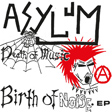 It amazes me that after what, a good thirty years of hardcore-punk enthusiasts digging up and reissuing obscurities, there are still shocking new finds to be made. I’m specifically blown away by the 7″ vinyl reissue of Is This The Price?, the sole release from Stoke-on-Trent’s Asylum which originally came on cassette in 1982. Sealed Records describes it as “the missing link between Discharge and Japanese noise-core”, and while I can certainly hear that, I’m also reminded of outsider American ‘core freaks like Psycho Sin, Maniax, Chemotherapy and Siege. Asylum really pushed the limits of “music” back in 1982 and I’m thrilled to hear it now; they blast through these six songs with pure abandon. Drums, bass, guitar and vocals are all there, but they seem to rarely link up in unison – rather, they play as fast and gnarly as they can, with a guitar tone so feebly blown-out that it recalls my sink’s garbage disposal more than anything attributable to Marshall or Fender. I truly love hardcore like this, the sort of blink-and-you’ll-miss band of miscreants I’d expect to see squeezed onto a Bullshit Detector comp or some eighty-band hand-copied cassette curated by the members of Lärm back in 1984. Brings a tear to my eye.
It amazes me that after what, a good thirty years of hardcore-punk enthusiasts digging up and reissuing obscurities, there are still shocking new finds to be made. I’m specifically blown away by the 7″ vinyl reissue of Is This The Price?, the sole release from Stoke-on-Trent’s Asylum which originally came on cassette in 1982. Sealed Records describes it as “the missing link between Discharge and Japanese noise-core”, and while I can certainly hear that, I’m also reminded of outsider American ‘core freaks like Psycho Sin, Maniax, Chemotherapy and Siege. Asylum really pushed the limits of “music” back in 1982 and I’m thrilled to hear it now; they blast through these six songs with pure abandon. Drums, bass, guitar and vocals are all there, but they seem to rarely link up in unison – rather, they play as fast and gnarly as they can, with a guitar tone so feebly blown-out that it recalls my sink’s garbage disposal more than anything attributable to Marshall or Fender. I truly love hardcore like this, the sort of blink-and-you’ll-miss band of miscreants I’d expect to see squeezed onto a Bullshit Detector comp or some eighty-band hand-copied cassette curated by the members of Lärm back in 1984. Brings a tear to my eye. For some reason, Bashford went with a fairly bland painting for the cover of their record, as opposed to the back cover photo of a hairy belly with the album title written on it. That’s just such a classic grunge move, the belly writing; it’s the sort of thing Tad and Mudhoney did to amuse themselves as rock critics watched on with baited breath in 1989. It’s fitting too, seeing as Bashford sound exactly like when you’re in fifth grade and you find out that some high schoolers cover Nirvana songs in their garage down the street and you finally dig up the courage to step onto their driveway. This is pure Sub Pop 200 music, right in line with The Fluid, Green River and the unfairly-decried Cat Butt. Somehow, it doesn’t seem to be a nostalgic homage so much as the group’s natural inclinations, which is cool with me, no matter how Cobain-esque singer-guitarist Luke Peltonen’s hoarse croak becomes. I dunno, while there’s absolutely nothing new or noteworthy happening here, it warms my heart to hear some new band worship early Nirvana like this way more than the latest deconstructed hyper-pop project or paint-by-numbers goth-wave group. There’s apparently more fifth-grader left in me than I realized.
For some reason, Bashford went with a fairly bland painting for the cover of their record, as opposed to the back cover photo of a hairy belly with the album title written on it. That’s just such a classic grunge move, the belly writing; it’s the sort of thing Tad and Mudhoney did to amuse themselves as rock critics watched on with baited breath in 1989. It’s fitting too, seeing as Bashford sound exactly like when you’re in fifth grade and you find out that some high schoolers cover Nirvana songs in their garage down the street and you finally dig up the courage to step onto their driveway. This is pure Sub Pop 200 music, right in line with The Fluid, Green River and the unfairly-decried Cat Butt. Somehow, it doesn’t seem to be a nostalgic homage so much as the group’s natural inclinations, which is cool with me, no matter how Cobain-esque singer-guitarist Luke Peltonen’s hoarse croak becomes. I dunno, while there’s absolutely nothing new or noteworthy happening here, it warms my heart to hear some new band worship early Nirvana like this way more than the latest deconstructed hyper-pop project or paint-by-numbers goth-wave group. There’s apparently more fifth-grader left in me than I realized. Nashville hardcore! You don’t hear those two words together too often, but I’m here for it, particularly as this debut one-sided flexi from Body Cam brings an appropriate level of scrawny fury. It’s rare that a “five songs in five minutes” record has ever let me down, and this square flexi is certainly no disappointment. Think of those earliest Gang Green tracks but messier – Body Cam pretty much never stop flailing throughout, with nary a mosh part in sight or even a valid reason to stage-dive. (Let’s face it: all the best stage-dives happen when they’re not supposed to, anyway.) There’s gotta be at least a few traditionalists out there who believe mosh parts ruined hardcore-punk, and while I’m not in that camp, I respect that opinion and am certain they’d approve of Body Cam. While much muddier and less distinctive than Tennessee’s greatest hardcore export, Koro, Body Cam are certainly in the same league, which is not a bad place to start.
Nashville hardcore! You don’t hear those two words together too often, but I’m here for it, particularly as this debut one-sided flexi from Body Cam brings an appropriate level of scrawny fury. It’s rare that a “five songs in five minutes” record has ever let me down, and this square flexi is certainly no disappointment. Think of those earliest Gang Green tracks but messier – Body Cam pretty much never stop flailing throughout, with nary a mosh part in sight or even a valid reason to stage-dive. (Let’s face it: all the best stage-dives happen when they’re not supposed to, anyway.) There’s gotta be at least a few traditionalists out there who believe mosh parts ruined hardcore-punk, and while I’m not in that camp, I respect that opinion and am certain they’d approve of Body Cam. While much muddier and less distinctive than Tennessee’s greatest hardcore export, Koro, Body Cam are certainly in the same league, which is not a bad place to start.  Another lathe-cut 7″ single from K. Campbell, a guy who’s clearly figured out a fun and appealing way to share his hobby with a small slice of the world. This is his fourth single on Poison Moon, all of which have been limited to twenty-or-so copies a piece with attractively designed sleeves. As far as I’m concerned, Campbell has a free pass to do whatever he wants on these personal totems – beatboxing, ocean noise, whatever – but he sticks with a highly pleasant form of poppy indie-rock here. “Breaking Glass” sounds like The Get Up Kids without the voice cracks, delivered casually yet confidently with a catchy chorus. “More Than A Memory” is a little more hushed and twee, a definite b-side that feels like something Merge would’ve offered up in 1995. Heck, if Merge released this as a slimline CD EP back then it probably would’ve sold ten thousand copies and been considered a modest success, but now there are actually fewer copies of Breaking Glass than kids in a standardized kindergarten class. Weird how that works, but K. Campbell doesn’t seem to mind one bit.
Another lathe-cut 7″ single from K. Campbell, a guy who’s clearly figured out a fun and appealing way to share his hobby with a small slice of the world. This is his fourth single on Poison Moon, all of which have been limited to twenty-or-so copies a piece with attractively designed sleeves. As far as I’m concerned, Campbell has a free pass to do whatever he wants on these personal totems – beatboxing, ocean noise, whatever – but he sticks with a highly pleasant form of poppy indie-rock here. “Breaking Glass” sounds like The Get Up Kids without the voice cracks, delivered casually yet confidently with a catchy chorus. “More Than A Memory” is a little more hushed and twee, a definite b-side that feels like something Merge would’ve offered up in 1995. Heck, if Merge released this as a slimline CD EP back then it probably would’ve sold ten thousand copies and been considered a modest success, but now there are actually fewer copies of Breaking Glass than kids in a standardized kindergarten class. Weird how that works, but K. Campbell doesn’t seem to mind one bit.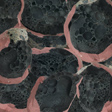 I meant to check out Canadian avant-songwriter Eric Chenaux after reading his Wire cover story a couple years back, but sadly forgot. Now I’m spinning his first solo album in four years, Say Laura, and appreciating the cozy warmth it offers on this particularly lengthy cold-snap we’re having here in the American Northeast. If you’re not familiar, he’s kind of a post-jazz, post-electronica, post-rock sorta guy, playing music that touches on ideas shared by Tortoise, Animal Collective, The Sea & Cake and Sam Gendel (to name but a few), but is clearly on his own trip. It’s a trip I’d describe as master noodling, as each of these lengthy five tracks spends significant amounts of time wiggling in free-form melodic bliss. He’ll noodle on his guitar, he’ll noodle with electronics, he even finds a way to noodle with his singing voice (and a harmonica, too). But much as noodles themselves vary from sixty-cent microwavable styrofoam cups to Michelin-starred ramen, musical noodling can greatly vary in quality, and Chenaux is instantly recognizable as a phenom, finding endless new patterns for melodies to converge and separate and take the long road home. His voice, a gender-neutral purr somewhere between Chet Baker and Caribou’s Dan Snaith, is the perfect foil. He could probably nail coffeehouse-friendly lite-jazz if he wanted, but bizarre and fascinating moves are preferred throughout, the guitar of “Your New Rhythm” being purposely detuned in real-time but one of them.
I meant to check out Canadian avant-songwriter Eric Chenaux after reading his Wire cover story a couple years back, but sadly forgot. Now I’m spinning his first solo album in four years, Say Laura, and appreciating the cozy warmth it offers on this particularly lengthy cold-snap we’re having here in the American Northeast. If you’re not familiar, he’s kind of a post-jazz, post-electronica, post-rock sorta guy, playing music that touches on ideas shared by Tortoise, Animal Collective, The Sea & Cake and Sam Gendel (to name but a few), but is clearly on his own trip. It’s a trip I’d describe as master noodling, as each of these lengthy five tracks spends significant amounts of time wiggling in free-form melodic bliss. He’ll noodle on his guitar, he’ll noodle with electronics, he even finds a way to noodle with his singing voice (and a harmonica, too). But much as noodles themselves vary from sixty-cent microwavable styrofoam cups to Michelin-starred ramen, musical noodling can greatly vary in quality, and Chenaux is instantly recognizable as a phenom, finding endless new patterns for melodies to converge and separate and take the long road home. His voice, a gender-neutral purr somewhere between Chet Baker and Caribou’s Dan Snaith, is the perfect foil. He could probably nail coffeehouse-friendly lite-jazz if he wanted, but bizarre and fascinating moves are preferred throughout, the guitar of “Your New Rhythm” being purposely detuned in real-time but one of them. I love stories of punks in realms far from your typical American and European cities, of which Crispy Newspaper are a prime example: this group resides in Yaktusk, Siberia, which is apparently Asia’s northernmost and coldest city. They sing in Sakha, a distinct Turkic language, and someway somehow their 2020 cassette has now been given a gatefold 12″ vinyl release care of Philadelphia’s own World Gone Mad. Nice! I will admit my ignorance to the existence of Yaktusk, let alone their punk scene, but it warms my heart to know that its young people are playing in bands, railing against power structures and probably having a bit of fun, too. Musically, I’d describe this as aggressive and poppy, modern-sounding hardcore-punk that reminds me of bands like Pandemix, Limp Wrist and I dunno, Night Birds maybe? None of those are spot-on references, but swirl them around and Crispy Newspaper would fit right into the mix. Yet another testament to the enduring universality of punk rock.
I love stories of punks in realms far from your typical American and European cities, of which Crispy Newspaper are a prime example: this group resides in Yaktusk, Siberia, which is apparently Asia’s northernmost and coldest city. They sing in Sakha, a distinct Turkic language, and someway somehow their 2020 cassette has now been given a gatefold 12″ vinyl release care of Philadelphia’s own World Gone Mad. Nice! I will admit my ignorance to the existence of Yaktusk, let alone their punk scene, but it warms my heart to know that its young people are playing in bands, railing against power structures and probably having a bit of fun, too. Musically, I’d describe this as aggressive and poppy, modern-sounding hardcore-punk that reminds me of bands like Pandemix, Limp Wrist and I dunno, Night Birds maybe? None of those are spot-on references, but swirl them around and Crispy Newspaper would fit right into the mix. Yet another testament to the enduring universality of punk rock.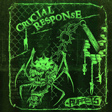 I giggled for an unreasonable length of time at the fact that this Indonesian hardcore band decided to call themselves Crucial Response, the name used by perhaps the most European of European youth-crew hardcore record labels. I both love and hate the way hardcore endlessly recycles the same few phrases; I shouldn’t be surprised when sometime in the future a new band from Florida or Portugal or Norway decides to call themselves Revelation or Judge or something, but I know I will be. Anyway, Crucial Response play some thick-necked hardcore, urgent and with a heavy metallic edge that all the kids at these mosh-em-up destination hardcore fests seem to enjoy. At points, I’m reminded of Wasted Time and Negative Approach’s Tied Down, though Puppets is a little more generic, for better or worse. Bruising hardcore with pictures of skull-spider spiked-chain weaponry (as rendered on the cover here) never goes out of style I suppose, no matter how many times it’s duplicated.
I giggled for an unreasonable length of time at the fact that this Indonesian hardcore band decided to call themselves Crucial Response, the name used by perhaps the most European of European youth-crew hardcore record labels. I both love and hate the way hardcore endlessly recycles the same few phrases; I shouldn’t be surprised when sometime in the future a new band from Florida or Portugal or Norway decides to call themselves Revelation or Judge or something, but I know I will be. Anyway, Crucial Response play some thick-necked hardcore, urgent and with a heavy metallic edge that all the kids at these mosh-em-up destination hardcore fests seem to enjoy. At points, I’m reminded of Wasted Time and Negative Approach’s Tied Down, though Puppets is a little more generic, for better or worse. Bruising hardcore with pictures of skull-spider spiked-chain weaponry (as rendered on the cover here) never goes out of style I suppose, no matter how many times it’s duplicated. No, The Dead Space isn’t a new social media platform for Jerry Garcia fans – okay, maybe it should be, but it’s also the name of this artsy post-punk trio out of Austin, TX. They’ve been around a few years, but Chlorine Sleep is my first exposure to the group, and the 12XU stamp of approval certainly makes sense upon listening. They’ve got a melodic-yet-discordant thing going on, sounding like a mix between the post-screamo noise-rock of Metz and the moody post-emo rock of Preoccupations, who coincidentally just co-headlined a tour together. The bass is heavy and tuneful, the drums deliver dramatic tom-based patterns, and the vocals are spoken-sung in a similar-yet-brighter register as (the rightfully-disgraced) Daughters. Songs might zigzag around like Wire’s least conventional tracks, but they fit in snugly with the other contemporary pro-‘tude noise-rockers I’ve already mentioned in this review – The Dead Space might gel best with folks who love At The Drive-In, not Unholy Swill. That bodes well for The Dead Space, then, seeing as there are roughly ten thousand At The Drive-In fans for every person willing to even acknowledge the existence of Unholy Swill.
No, The Dead Space isn’t a new social media platform for Jerry Garcia fans – okay, maybe it should be, but it’s also the name of this artsy post-punk trio out of Austin, TX. They’ve been around a few years, but Chlorine Sleep is my first exposure to the group, and the 12XU stamp of approval certainly makes sense upon listening. They’ve got a melodic-yet-discordant thing going on, sounding like a mix between the post-screamo noise-rock of Metz and the moody post-emo rock of Preoccupations, who coincidentally just co-headlined a tour together. The bass is heavy and tuneful, the drums deliver dramatic tom-based patterns, and the vocals are spoken-sung in a similar-yet-brighter register as (the rightfully-disgraced) Daughters. Songs might zigzag around like Wire’s least conventional tracks, but they fit in snugly with the other contemporary pro-‘tude noise-rockers I’ve already mentioned in this review – The Dead Space might gel best with folks who love At The Drive-In, not Unholy Swill. That bodes well for The Dead Space, then, seeing as there are roughly ten thousand At The Drive-In fans for every person willing to even acknowledge the existence of Unholy Swill.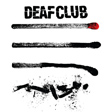 It often seems like a safe bet that any given ’70s/’80s/’90s punk icon will eventually completely humiliate themselves via their own cluelessness or get rightfully cancelled by those they’ve hurt over the years, but I’m happy that Justin Pearson (of Swing Kids, Crimson Curse and most notably, The Locust) is a strong counter-example. Rather than resting on his glory days, being outed for abuse, or espousing some “edgy” form of conservative views, he’s as DIY and punk as ever, still putting out his own records and kicking against the pricks. One of his current bands is Deaf Club, and Productive Disruption is my first experience hearing the group. It’s pretty cool! This is very much in line with The Locust’s relentless and abruptly-changing grind; with a dearth of synths, I’d say I’m reminded most of early Dillinger Escape Plan in the way that mathematical time signatures are utilized for hardcore-grind blasting. Pearson yowls in a fairly continuous tone throughout, much in the same way he’s been doing in various bands for the past three decades, and with this extremely tight and well-rehearsed outfit, it sounds great. Kinda funny that they have a song called “Public Acid” – it can’t be a tribute to the band of the same name, can it? – but that just leaves the door open for Public Acid to write a song called “Deaf Club” whenever they’re feeling up for it. After all, true hardcore-punk isn’t a diatribe, it’s a conversation (or argument).
It often seems like a safe bet that any given ’70s/’80s/’90s punk icon will eventually completely humiliate themselves via their own cluelessness or get rightfully cancelled by those they’ve hurt over the years, but I’m happy that Justin Pearson (of Swing Kids, Crimson Curse and most notably, The Locust) is a strong counter-example. Rather than resting on his glory days, being outed for abuse, or espousing some “edgy” form of conservative views, he’s as DIY and punk as ever, still putting out his own records and kicking against the pricks. One of his current bands is Deaf Club, and Productive Disruption is my first experience hearing the group. It’s pretty cool! This is very much in line with The Locust’s relentless and abruptly-changing grind; with a dearth of synths, I’d say I’m reminded most of early Dillinger Escape Plan in the way that mathematical time signatures are utilized for hardcore-grind blasting. Pearson yowls in a fairly continuous tone throughout, much in the same way he’s been doing in various bands for the past three decades, and with this extremely tight and well-rehearsed outfit, it sounds great. Kinda funny that they have a song called “Public Acid” – it can’t be a tribute to the band of the same name, can it? – but that just leaves the door open for Public Acid to write a song called “Deaf Club” whenever they’re feeling up for it. After all, true hardcore-punk isn’t a diatribe, it’s a conversation (or argument). On their sixth self-released seven-inch in three years, upstate New York’s Eyes And Flys are in full-band mode here, pumping out two songs about their working-class perspective. Bandleader Patrick Shanahan even includes copies of his OSHA and asbestos ID cards in the insert, confirming that this is the work or someone down in the trenches (apparently literally), not a rich-kid fantasy written from the perspective of the proletariat. “Asbestos Fiber In A Sunbeam” is the rightful a-side, a groovy garage-punk slam that pairs the vocal stylings of Mayyors with a rousing, guitar-driven sound that’s as Mummies-esque as it is Dillinger Four. “Sad Labor” is a little restrained, though the sentiment remains the same. The chorus repeats the lines “this is your roll (sic) / get in the hole”, which reads like it should be a Swans song, but it actually sounds more like a brief agitated moment located within Spray Paint’s back catalog alongside some lonesome guitar crumbs. Already setting my clock for Eyes And Flys seventh self-released seven-inch, probably due any day now.
On their sixth self-released seven-inch in three years, upstate New York’s Eyes And Flys are in full-band mode here, pumping out two songs about their working-class perspective. Bandleader Patrick Shanahan even includes copies of his OSHA and asbestos ID cards in the insert, confirming that this is the work or someone down in the trenches (apparently literally), not a rich-kid fantasy written from the perspective of the proletariat. “Asbestos Fiber In A Sunbeam” is the rightful a-side, a groovy garage-punk slam that pairs the vocal stylings of Mayyors with a rousing, guitar-driven sound that’s as Mummies-esque as it is Dillinger Four. “Sad Labor” is a little restrained, though the sentiment remains the same. The chorus repeats the lines “this is your roll (sic) / get in the hole”, which reads like it should be a Swans song, but it actually sounds more like a brief agitated moment located within Spray Paint’s back catalog alongside some lonesome guitar crumbs. Already setting my clock for Eyes And Flys seventh self-released seven-inch, probably due any day now. Glad to be hipped to this new project from a few of Philadelphia’s post-noise-diaspora players – I’m talking about Jesse Dewlow (aka People Skills) and Jim Strong of Melkings alongside Esther Scanlund and Goda Trakumaite. They’ve put together an oddly compelling vinyl debut in Sift, which I’d liken closest to an American take on the communal domestic clamor of Enhet För Fri Musik, with a touch of the DIY swirl found within the deep discography of Ashtray Navigations. It’s also not far from the patient, brooding melancholy of a People Skills record, and there’s just enough “random objects being shuffled around” sounds on here to make the Melkings connection. Guitar is prominent too, and rather than being played in a discordant Sonic Youth-y style (as is the general tradition of noise-based improv bands), wistful melodies unfurl over many of these tracks. If you tried to imagine the Kye Records equivalent of “indie rock”, Sift might be within that orbit, though the Kye side of the equation is certainly weighted heavier here (much to my delight). As preciously odd as any given New Zealand avant-DIY lathe cut, but mass-produced on pristine black vinyl care of London’s Horn Of Plenty.
Glad to be hipped to this new project from a few of Philadelphia’s post-noise-diaspora players – I’m talking about Jesse Dewlow (aka People Skills) and Jim Strong of Melkings alongside Esther Scanlund and Goda Trakumaite. They’ve put together an oddly compelling vinyl debut in Sift, which I’d liken closest to an American take on the communal domestic clamor of Enhet För Fri Musik, with a touch of the DIY swirl found within the deep discography of Ashtray Navigations. It’s also not far from the patient, brooding melancholy of a People Skills record, and there’s just enough “random objects being shuffled around” sounds on here to make the Melkings connection. Guitar is prominent too, and rather than being played in a discordant Sonic Youth-y style (as is the general tradition of noise-based improv bands), wistful melodies unfurl over many of these tracks. If you tried to imagine the Kye Records equivalent of “indie rock”, Sift might be within that orbit, though the Kye side of the equation is certainly weighted heavier here (much to my delight). As preciously odd as any given New Zealand avant-DIY lathe cut, but mass-produced on pristine black vinyl care of London’s Horn Of Plenty. Sad to say, the times seem to have gotten to the normally-precocious Gentleman Jesse – rather than posing for the cover with his guitar or alongside friends in snappy shirts and poses, Lose Everything features a black and white photo of some unremarkable underpass, the sort of place that has a “no dumping” sign where everyone illegally dumps anyway. And the album title doesn’t provide much hope either! Rest assured, this newfound moroseness doesn’t extend to the music of Lose Everything, though I wouldn’t necessarily call this “happy” music either… it’s sharp power-pop rock that is reasonably cautious about the future and wary of good news, which certainly makes sense given the era in which it was written and recorded. If anything, I find myself reminded quite a bit of Ted Leo here, in the way that Gentleman Jesse attacks his American guitar-pop with sincerity and energy, a firm believer in his own music (and rightly so). Kind of strange that such a nuanced, emotionally-mature album comes to us from Beach Impediment, a label I associate with muscular skulls punching through brick walls, though stranger combinations have certainly happened. Gentleman Jesse prefers to channel his discontent and malaise through chiming guitars and charming melodies (though a single ignorant mosh breakdown wouldn’t have killed him).
Sad to say, the times seem to have gotten to the normally-precocious Gentleman Jesse – rather than posing for the cover with his guitar or alongside friends in snappy shirts and poses, Lose Everything features a black and white photo of some unremarkable underpass, the sort of place that has a “no dumping” sign where everyone illegally dumps anyway. And the album title doesn’t provide much hope either! Rest assured, this newfound moroseness doesn’t extend to the music of Lose Everything, though I wouldn’t necessarily call this “happy” music either… it’s sharp power-pop rock that is reasonably cautious about the future and wary of good news, which certainly makes sense given the era in which it was written and recorded. If anything, I find myself reminded quite a bit of Ted Leo here, in the way that Gentleman Jesse attacks his American guitar-pop with sincerity and energy, a firm believer in his own music (and rightly so). Kind of strange that such a nuanced, emotionally-mature album comes to us from Beach Impediment, a label I associate with muscular skulls punching through brick walls, though stranger combinations have certainly happened. Gentleman Jesse prefers to channel his discontent and malaise through chiming guitars and charming melodies (though a single ignorant mosh breakdown wouldn’t have killed him).  It always felt like DC’s Protect-U received less admiration and praise than they deserved, but no one said making introspective experimental techno was a quick trip to fame and fortune. As Geo Rip (the pairing of Protect-U’s Mike Petillo and Aaron Leitko with Dope Body’s John Jones), they’re poised to turn at least a few new heads care of the reputation of the tastemaking Trilogy Tapes label, and rightfully so. They’ve always been on this path, an inquisitive, wonky-rhythmed adventure into the most tweaked sounds one could reasonably call electronic dance music, and on this vinyl debut Geo Rip display the fruits of their labor. I want to say “Drop-In Center” sounds like a badly heat-warped Vakula record, but that betrays the time and precision that Geo Rip clearly put into crafting it, which is evident even at its loosest moments. “Nah Press Fake Text” unexpectedly raises the BPM, ping-ponging across the sound-field with dazzling color… much like b-side opener “Tooni”, these tracks sound like the tropical bird room at the zoo both literally and figuratively. They wrap with “Underwater Bodycam”, which points towards a future in which Fennesz, The Field, Oneohtrix Point Never and the Hessle Audio roster are spotted running down a grassy hill together, arms entwined. The vaguely-anthropomorphic brain-teaser toy on the cover is a perfect match for the sounds within, as quizzical as it is simple fun.
It always felt like DC’s Protect-U received less admiration and praise than they deserved, but no one said making introspective experimental techno was a quick trip to fame and fortune. As Geo Rip (the pairing of Protect-U’s Mike Petillo and Aaron Leitko with Dope Body’s John Jones), they’re poised to turn at least a few new heads care of the reputation of the tastemaking Trilogy Tapes label, and rightfully so. They’ve always been on this path, an inquisitive, wonky-rhythmed adventure into the most tweaked sounds one could reasonably call electronic dance music, and on this vinyl debut Geo Rip display the fruits of their labor. I want to say “Drop-In Center” sounds like a badly heat-warped Vakula record, but that betrays the time and precision that Geo Rip clearly put into crafting it, which is evident even at its loosest moments. “Nah Press Fake Text” unexpectedly raises the BPM, ping-ponging across the sound-field with dazzling color… much like b-side opener “Tooni”, these tracks sound like the tropical bird room at the zoo both literally and figuratively. They wrap with “Underwater Bodycam”, which points towards a future in which Fennesz, The Field, Oneohtrix Point Never and the Hessle Audio roster are spotted running down a grassy hill together, arms entwined. The vaguely-anthropomorphic brain-teaser toy on the cover is a perfect match for the sounds within, as quizzical as it is simple fun.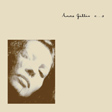 The Art Into Life label is full of understated, glorious surprises, and this new album from abstract-electronics lifer Anne Gillis fits right into that category. She’s been releasing odd, unassuming noise records since the early ’80s, and apparently sneaked in a trip to Japan in 2020 to play a live show in celebration of her retrospective box-set release, which is documented here. The quality here is great, and with a total lack of human interaction or crowd noise, it feels like a proper full-length. The label promo says that the works here are constructed from “primitive hiss noise and error sounds”, and well, I couldn’t have summed it up better myself. Low-level industrial thrum meets malfunctioning electronics in deeply hypnotic ways, not at all harsh but oddly soothing, at least if you’re the type of person who’s ever stopped what you were doing to listen to the air conditioner. Occasionally Gillis’s voice appears, but she sounds more like a rudimentary theremin than a human exercising their vocal cords. In a way, I’m reminded of Phew, but even Phew sounds downright poppy with her Suicide-styled synth patterns compared to the desolate and ruined soundscapes offered by Gillis here. The sole exception to the rule is “Appel À La Base”, which actually has some sort of cold-wave sway and a drum machine beat, draped in static though it may be. Impeccable album!
The Art Into Life label is full of understated, glorious surprises, and this new album from abstract-electronics lifer Anne Gillis fits right into that category. She’s been releasing odd, unassuming noise records since the early ’80s, and apparently sneaked in a trip to Japan in 2020 to play a live show in celebration of her retrospective box-set release, which is documented here. The quality here is great, and with a total lack of human interaction or crowd noise, it feels like a proper full-length. The label promo says that the works here are constructed from “primitive hiss noise and error sounds”, and well, I couldn’t have summed it up better myself. Low-level industrial thrum meets malfunctioning electronics in deeply hypnotic ways, not at all harsh but oddly soothing, at least if you’re the type of person who’s ever stopped what you were doing to listen to the air conditioner. Occasionally Gillis’s voice appears, but she sounds more like a rudimentary theremin than a human exercising their vocal cords. In a way, I’m reminded of Phew, but even Phew sounds downright poppy with her Suicide-styled synth patterns compared to the desolate and ruined soundscapes offered by Gillis here. The sole exception to the rule is “Appel À La Base”, which actually has some sort of cold-wave sway and a drum machine beat, draped in static though it may be. Impeccable album! Apparently unsatisfied with merely The Cowboys as a vessel for his songs, guitarist/singer/songwriter Keith Harman started Good Looking Son, another band based around his glammy power-pop dreams. This six-song EP features more of his American power-pop stylings; upbeat, courteous and slightly silly tunes that always go down smooth. Though hailing from Cincinnati circa now, these songs give me an upstate New Jersey vibe circa 1980, like that of a weekly-gigging bar-band whose songwriting aspirations exceed that of the Cheap Trick and Tommy Tutone songs they’re forced to cover. At least two different bands named The Boyfriends fit this description, and they remind me of Good Looking Son, though there’s a bit of a platform-shoe glitz to these songs as well, perhaps the remnants of a T. Rex love affair. Not sure if Feel It is interested in becoming the BOMP! Records of today, but records like this might earn them that distinction.
Apparently unsatisfied with merely The Cowboys as a vessel for his songs, guitarist/singer/songwriter Keith Harman started Good Looking Son, another band based around his glammy power-pop dreams. This six-song EP features more of his American power-pop stylings; upbeat, courteous and slightly silly tunes that always go down smooth. Though hailing from Cincinnati circa now, these songs give me an upstate New Jersey vibe circa 1980, like that of a weekly-gigging bar-band whose songwriting aspirations exceed that of the Cheap Trick and Tommy Tutone songs they’re forced to cover. At least two different bands named The Boyfriends fit this description, and they remind me of Good Looking Son, though there’s a bit of a platform-shoe glitz to these songs as well, perhaps the remnants of a T. Rex love affair. Not sure if Feel It is interested in becoming the BOMP! Records of today, but records like this might earn them that distinction.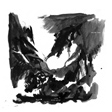 Chances are, you don’t know nothing about nothing when it comes to IbonRG and Enrike Hurtado, and let me tell you friend, I’m right there with you! This collaborative LP is my first experience with these two Basque artists, while I’ve yet to uncover a better section to file this than “experimental”, these two clearly have their own specific intents. It’s a duo (IbonRG is just one guy, if that wasn’t evident), but they seem to take turns throughout, with one of them playing piano or txalaparta (an “ancient Basque wooden instrument” used percussively) while the other sits it out, or perhaps augments the sound with electronic software manipulation. Mostly though oMOrruMU baMAt sounds like a seated theater performance, with lengthy vocal ballads sung with or without musical accompaniment (and if so, usually piano). The lyrics are taken from poetry by the artist/poet Joxan Artze, and while my understanding of the Basque language is non-existent, IbonRG and Hurtado have no trouble communicating beyond language, with songs that conjure an ancient mournfulness or an elusive beauty. It comes with a thick booklet that pairs abstract paintings/scribbles with each track, as if the artfulness wasn’t already seeping out of the album’s every pore.
Chances are, you don’t know nothing about nothing when it comes to IbonRG and Enrike Hurtado, and let me tell you friend, I’m right there with you! This collaborative LP is my first experience with these two Basque artists, while I’ve yet to uncover a better section to file this than “experimental”, these two clearly have their own specific intents. It’s a duo (IbonRG is just one guy, if that wasn’t evident), but they seem to take turns throughout, with one of them playing piano or txalaparta (an “ancient Basque wooden instrument” used percussively) while the other sits it out, or perhaps augments the sound with electronic software manipulation. Mostly though oMOrruMU baMAt sounds like a seated theater performance, with lengthy vocal ballads sung with or without musical accompaniment (and if so, usually piano). The lyrics are taken from poetry by the artist/poet Joxan Artze, and while my understanding of the Basque language is non-existent, IbonRG and Hurtado have no trouble communicating beyond language, with songs that conjure an ancient mournfulness or an elusive beauty. It comes with a thick booklet that pairs abstract paintings/scribbles with each track, as if the artfulness wasn’t already seeping out of the album’s every pore.  Sometimes you’re scrolling through the bins, be they in a record shop or digital, and a name just grabs you. Such is the case for me and Klon Dump, a name that immediately calls to mind Nico talking about a clown that pooped. That’s all it took! That and the kind of funny center sticker pic of some guy, presumably not Klon Dump himself, though I’d be happy if it was. Anyway, it was a serendipitous moment, as these two songs are pretty dope… smartly funky minimal techno outta Berlin. “Verklärte Dumpster” is kind of a glitchy, analog-sounding take on my favorite Perlon records. Snappy drums pair with an amusing vocal sample in a very Melchior Productions sorta way, the sorta combo that can fail as easily as it can succeed, but it’s a home run here. “Klon Mundo – Klon Domo” is the flip and it raises the energy level, a pile of twitching wires that eventually recall a particularly frantic round of Super Mario Kart. Very fun techno stuff, though it’s “Verklärte Dumpster” that demands the repeated playback for me. Say it with me: Klon Dump!
Sometimes you’re scrolling through the bins, be they in a record shop or digital, and a name just grabs you. Such is the case for me and Klon Dump, a name that immediately calls to mind Nico talking about a clown that pooped. That’s all it took! That and the kind of funny center sticker pic of some guy, presumably not Klon Dump himself, though I’d be happy if it was. Anyway, it was a serendipitous moment, as these two songs are pretty dope… smartly funky minimal techno outta Berlin. “Verklärte Dumpster” is kind of a glitchy, analog-sounding take on my favorite Perlon records. Snappy drums pair with an amusing vocal sample in a very Melchior Productions sorta way, the sorta combo that can fail as easily as it can succeed, but it’s a home run here. “Klon Mundo – Klon Domo” is the flip and it raises the energy level, a pile of twitching wires that eventually recall a particularly frantic round of Super Mario Kart. Very fun techno stuff, though it’s “Verklärte Dumpster” that demands the repeated playback for me. Say it with me: Klon Dump! So often, I feel like Chicago hardcore-punk aims for a humble, gritty realness, whereas their natives Man Eaters are completely outsized and wild. From their art to their sound to their physical appearance (four out of four longhairs, three out of four mustaches, one out of four cyberpunk Al Jourgensen-style sunglasses), they go big, and that bigness is expressed with gusto on their sophomore full-length, Twelve More Observations On Healthy Living. I hope to see this band live someday, if only to verify that they’re as larger than life in person as they are on record. Much of Twelve More reminds me of Motörhead if they weren’t a band but rather a Robert Crumb comic book that got banned from most high schools. Drugs are rampant, denim is stained and the party never ends, no matter who’s still awake. The mix of bad-ass rock n’ roll and hardcore-punk that Annihilation Time promised is operating at full capacity here, and I’d say improved upon. Much like Toronto hardcore band Omegas exploded classic NYHC iconography to their own cartoonish ends, Man Eaters have taken their cues from late ’80s Poison Idea and dialed everything up to eleven.
So often, I feel like Chicago hardcore-punk aims for a humble, gritty realness, whereas their natives Man Eaters are completely outsized and wild. From their art to their sound to their physical appearance (four out of four longhairs, three out of four mustaches, one out of four cyberpunk Al Jourgensen-style sunglasses), they go big, and that bigness is expressed with gusto on their sophomore full-length, Twelve More Observations On Healthy Living. I hope to see this band live someday, if only to verify that they’re as larger than life in person as they are on record. Much of Twelve More reminds me of Motörhead if they weren’t a band but rather a Robert Crumb comic book that got banned from most high schools. Drugs are rampant, denim is stained and the party never ends, no matter who’s still awake. The mix of bad-ass rock n’ roll and hardcore-punk that Annihilation Time promised is operating at full capacity here, and I’d say improved upon. Much like Toronto hardcore band Omegas exploded classic NYHC iconography to their own cartoonish ends, Man Eaters have taken their cues from late ’80s Poison Idea and dialed everything up to eleven. Polish goth-rockers Nameless Creations follow their 2019 album with this new single, and with its cover drawing of a 1920s flapper with a naked devil-man on a leash, how could I not give it a try? I remember their album as sounding kinda raw, pained and morbid – to be honest, I haven’t spun it since writing the review back in the sweetly naive winter of 2019 – but “Pain-Powered Machine” comes bursting through the door. They probably sound more like The Hives than they realize here, albeit somewhat neutralized by the piano-led swagger I’d associate with Pleasure Forever. It’s not overly arena-sized, but I still can’t imagine that many obsessive fans of My Chemical Romance and AFI would snub their noses at it. “Things That Serve” allows the half-drunk bluster of the a-side to fully take over, swaying like a small boat in the wake of a larger one, which is emphasized by the brief violin solo. Vocalist Dorian Wiseblood quickly interrupts it with his tirade against (or for?) love, sounding as if World Inferno Friendship Society were booked for a controversial funeral. If your name is “Dorian Wiseblood”, you damn sure better be playing music in a band like this!
Polish goth-rockers Nameless Creations follow their 2019 album with this new single, and with its cover drawing of a 1920s flapper with a naked devil-man on a leash, how could I not give it a try? I remember their album as sounding kinda raw, pained and morbid – to be honest, I haven’t spun it since writing the review back in the sweetly naive winter of 2019 – but “Pain-Powered Machine” comes bursting through the door. They probably sound more like The Hives than they realize here, albeit somewhat neutralized by the piano-led swagger I’d associate with Pleasure Forever. It’s not overly arena-sized, but I still can’t imagine that many obsessive fans of My Chemical Romance and AFI would snub their noses at it. “Things That Serve” allows the half-drunk bluster of the a-side to fully take over, swaying like a small boat in the wake of a larger one, which is emphasized by the brief violin solo. Vocalist Dorian Wiseblood quickly interrupts it with his tirade against (or for?) love, sounding as if World Inferno Friendship Society were booked for a controversial funeral. If your name is “Dorian Wiseblood”, you damn sure better be playing music in a band like this!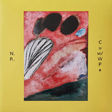 Berlin-based musician and artist David Roeder takes the step from tape to wax with Catch Up With What Party, his vinyl debut which compiles, re-works and adds onto material from two recent cassette releases. He operates in the “lonesome shadowy man with access to a few basic instruments and a tape recorder” vein, offering no fewer than twenty-three tracks on here. You’d think there might be some beam of light or human connection to be extended on such a lengthy outing, but these vignettes are pretty opaque, music that seems to be hiding from the listener as well as itself. A guitar strums aimlessly in a cul-de-sac, a pump organ hums in the corner of some Twin Peaks bedroom, vocals are intoned so ominously low that making out the words is near impossible… scrutiny is futile. The record often feels like a crime-noir without a plot; conflict and action are replaced with empty courtyards and vague muttering, excused as art for art’s sake. On one hand, I’m inclined to think that Catch Up With What Party could’ve benefited from some editing, but on the other, part of the point seems to be its large spread of musical mundanities, a sonic map smudged beyond recognition.
Berlin-based musician and artist David Roeder takes the step from tape to wax with Catch Up With What Party, his vinyl debut which compiles, re-works and adds onto material from two recent cassette releases. He operates in the “lonesome shadowy man with access to a few basic instruments and a tape recorder” vein, offering no fewer than twenty-three tracks on here. You’d think there might be some beam of light or human connection to be extended on such a lengthy outing, but these vignettes are pretty opaque, music that seems to be hiding from the listener as well as itself. A guitar strums aimlessly in a cul-de-sac, a pump organ hums in the corner of some Twin Peaks bedroom, vocals are intoned so ominously low that making out the words is near impossible… scrutiny is futile. The record often feels like a crime-noir without a plot; conflict and action are replaced with empty courtyards and vague muttering, excused as art for art’s sake. On one hand, I’m inclined to think that Catch Up With What Party could’ve benefited from some editing, but on the other, part of the point seems to be its large spread of musical mundanities, a sonic map smudged beyond recognition. 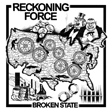 Let’s see, a map of the US rendered in brittle soil and filled human silhouettes trapped in gears while old-timey plutocrats look on with murderous lust and big bags with dollar signs on them… precisely what I want to see on a hardcore album cover! Reckoning Force understands America’s failure, which, let’s be honest, is only missed by the willfully ignorant at this point, but they answer the call with a 45 RPM album of raging American hardcore. Hailing from Virginia Beach, Reckoning Force must be used to the endless fighter jets pointlessly patrolling over head (and costing us millions of dollars in the process), so they slam through these ten tracks in a punchy, not-too-raw style that will surely appeal to both hardcore kids and hardcore punks alike (you know the distinction). Reminds me of Virginia locals like Wasted Time and Government Warning alongside a clear working knowledge of the X-Claim! catalog, and probably a familiarity with some of the harder-edged youth-crew that Youngblood Records has produced through the years. Nothing game changing, or even particularly distinctive, but as a form of art and social protest, good hardcore-punk need not reinvent the wheel, it simply needs to slap spikes on that wheel and roll it full-speed into the police station and the politician’s mansion. Broken State does just that.
Let’s see, a map of the US rendered in brittle soil and filled human silhouettes trapped in gears while old-timey plutocrats look on with murderous lust and big bags with dollar signs on them… precisely what I want to see on a hardcore album cover! Reckoning Force understands America’s failure, which, let’s be honest, is only missed by the willfully ignorant at this point, but they answer the call with a 45 RPM album of raging American hardcore. Hailing from Virginia Beach, Reckoning Force must be used to the endless fighter jets pointlessly patrolling over head (and costing us millions of dollars in the process), so they slam through these ten tracks in a punchy, not-too-raw style that will surely appeal to both hardcore kids and hardcore punks alike (you know the distinction). Reminds me of Virginia locals like Wasted Time and Government Warning alongside a clear working knowledge of the X-Claim! catalog, and probably a familiarity with some of the harder-edged youth-crew that Youngblood Records has produced through the years. Nothing game changing, or even particularly distinctive, but as a form of art and social protest, good hardcore-punk need not reinvent the wheel, it simply needs to slap spikes on that wheel and roll it full-speed into the police station and the politician’s mansion. Broken State does just that. At this point, I don’t begrudge anyone for curling up in a protective zone of nostalgia as a means of making it through the day. Things really stink these days, so if you wanna try to beat Metroid again or binge-watch Fred Savage’s movies from the ’80s and ’90s, I certainly won’t try to stop you! This reissue from Adam Roth & His Band Of Men is pure rock nostalgia, even if you haven’t heard it before, which I presume is the case for the vast majority of those reading this. I love me some first-wave power-pop but hadn’t heard of this album before, and it’s a very fun and teenaged romp, the sort of thing I’d expect to hear blasting during a scene where the cool-but-outcast main character walks into high school on the first day, avoiding stoners on skateboards and jocks playing catch. Very High School USA… as “Judy Won’t You Dance With Me?” hits, I’m picturing Michael J. Fox and Dana Plato dancing in the cafeteria while Todd Bridges looks on in admiration. One buddy of mine is obsessed with those movies, from Jocks to Prayer Of The Rollerboys, and I’m gonna give him my copy of this record. The only thing better than keeping a record you like is giving it to someone who’ll love it.
At this point, I don’t begrudge anyone for curling up in a protective zone of nostalgia as a means of making it through the day. Things really stink these days, so if you wanna try to beat Metroid again or binge-watch Fred Savage’s movies from the ’80s and ’90s, I certainly won’t try to stop you! This reissue from Adam Roth & His Band Of Men is pure rock nostalgia, even if you haven’t heard it before, which I presume is the case for the vast majority of those reading this. I love me some first-wave power-pop but hadn’t heard of this album before, and it’s a very fun and teenaged romp, the sort of thing I’d expect to hear blasting during a scene where the cool-but-outcast main character walks into high school on the first day, avoiding stoners on skateboards and jocks playing catch. Very High School USA… as “Judy Won’t You Dance With Me?” hits, I’m picturing Michael J. Fox and Dana Plato dancing in the cafeteria while Todd Bridges looks on in admiration. One buddy of mine is obsessed with those movies, from Jocks to Prayer Of The Rollerboys, and I’m gonna give him my copy of this record. The only thing better than keeping a record you like is giving it to someone who’ll love it. Who among us hasn’t fantasized about playing in an evil metal band? Directly lifting the visual and sonic aesthetics of Venom and Celtic Frost, wearing spiked gauntlets and black eye makeup and doing your best “invisible oranges” pose in the local graveyard. It’s an incredibly alluring proposition, but most of us tend to leave it at the fantasy stage, whereas the men of Total Hell acted on these morbid desires and started this band. Composed of DD Owen and members of garage-punk bands Trampoline Team and Buck Biloxi & The Fucks, these guys put on their heavy metal costumes and give it a go, to results both undeniable and unremarkable. I’m not saying you can’t play snotty pop-punk one day and evil blackened metal the next, but if you’re the type of listener who adamantly demands authentic heavy metal destruction, you might be able to sniff out the weekend warriors from the lifers. Regardless of your particular stance, Total Hell are all-in with this debut 12″, complete with fantasy lyrics, Satanic voice-overs and the whinnying of a black-winged stallion (check the intro to “Disfigured”). Venom worship brought to you by Goner Records in precisely the way you might imagine Goner Records would bring you Venom worship.
Who among us hasn’t fantasized about playing in an evil metal band? Directly lifting the visual and sonic aesthetics of Venom and Celtic Frost, wearing spiked gauntlets and black eye makeup and doing your best “invisible oranges” pose in the local graveyard. It’s an incredibly alluring proposition, but most of us tend to leave it at the fantasy stage, whereas the men of Total Hell acted on these morbid desires and started this band. Composed of DD Owen and members of garage-punk bands Trampoline Team and Buck Biloxi & The Fucks, these guys put on their heavy metal costumes and give it a go, to results both undeniable and unremarkable. I’m not saying you can’t play snotty pop-punk one day and evil blackened metal the next, but if you’re the type of listener who adamantly demands authentic heavy metal destruction, you might be able to sniff out the weekend warriors from the lifers. Regardless of your particular stance, Total Hell are all-in with this debut 12″, complete with fantasy lyrics, Satanic voice-overs and the whinnying of a black-winged stallion (check the intro to “Disfigured”). Venom worship brought to you by Goner Records in precisely the way you might imagine Goner Records would bring you Venom worship. It’s funny how many aggressive noise-rock bands pride themselves on being a “downer”, thinking that their big ugly noisy riffs will stir up a negative mood for anyone in their vicinity, whereas it’s actually this upbeat indie-rock album from LA’s Wake Up that’s got me more sullen than the gnarliest Drunks With Guns clone. It’s because Tigers Can’t Be Choosers is dedicated to the memory of Carlo Gonzalez, the drummer of Wake Up at the time of this recording, as well as the memory of Thomas John Fekete, who sings and plays guitar on a digital-only bonus track. I don’t know if my peer group has simply gotten old and it’s always been like this for adults beyond their twenties, but it feels more and more commonplace to have our friends die in very recent times, and it takes me a moment to shake that thought once it’s entered my head. Sorry if I just did that to you now, too. Anyway, for an emo-adjacent indie-rock group, Wake Up don’t sound remotely morose here, preferring instead to weave their way through songs that are equal parts Promise Ring, Pavement and the basements where fans of those two bands congregate. Fun is clearly being had, and seeing as Wake Up recorded it back in 2013 before going on a tour with Surfer Blood (and seemingly self-released it on their own “Paul Is Dead Records” label – sheesh), I’m glad they go to share that exciting moment in their lives and capture the lazy happy songs that went along with it.
It’s funny how many aggressive noise-rock bands pride themselves on being a “downer”, thinking that their big ugly noisy riffs will stir up a negative mood for anyone in their vicinity, whereas it’s actually this upbeat indie-rock album from LA’s Wake Up that’s got me more sullen than the gnarliest Drunks With Guns clone. It’s because Tigers Can’t Be Choosers is dedicated to the memory of Carlo Gonzalez, the drummer of Wake Up at the time of this recording, as well as the memory of Thomas John Fekete, who sings and plays guitar on a digital-only bonus track. I don’t know if my peer group has simply gotten old and it’s always been like this for adults beyond their twenties, but it feels more and more commonplace to have our friends die in very recent times, and it takes me a moment to shake that thought once it’s entered my head. Sorry if I just did that to you now, too. Anyway, for an emo-adjacent indie-rock group, Wake Up don’t sound remotely morose here, preferring instead to weave their way through songs that are equal parts Promise Ring, Pavement and the basements where fans of those two bands congregate. Fun is clearly being had, and seeing as Wake Up recorded it back in 2013 before going on a tour with Surfer Blood (and seemingly self-released it on their own “Paul Is Dead Records” label – sheesh), I’m glad they go to share that exciting moment in their lives and capture the lazy happy songs that went along with it.